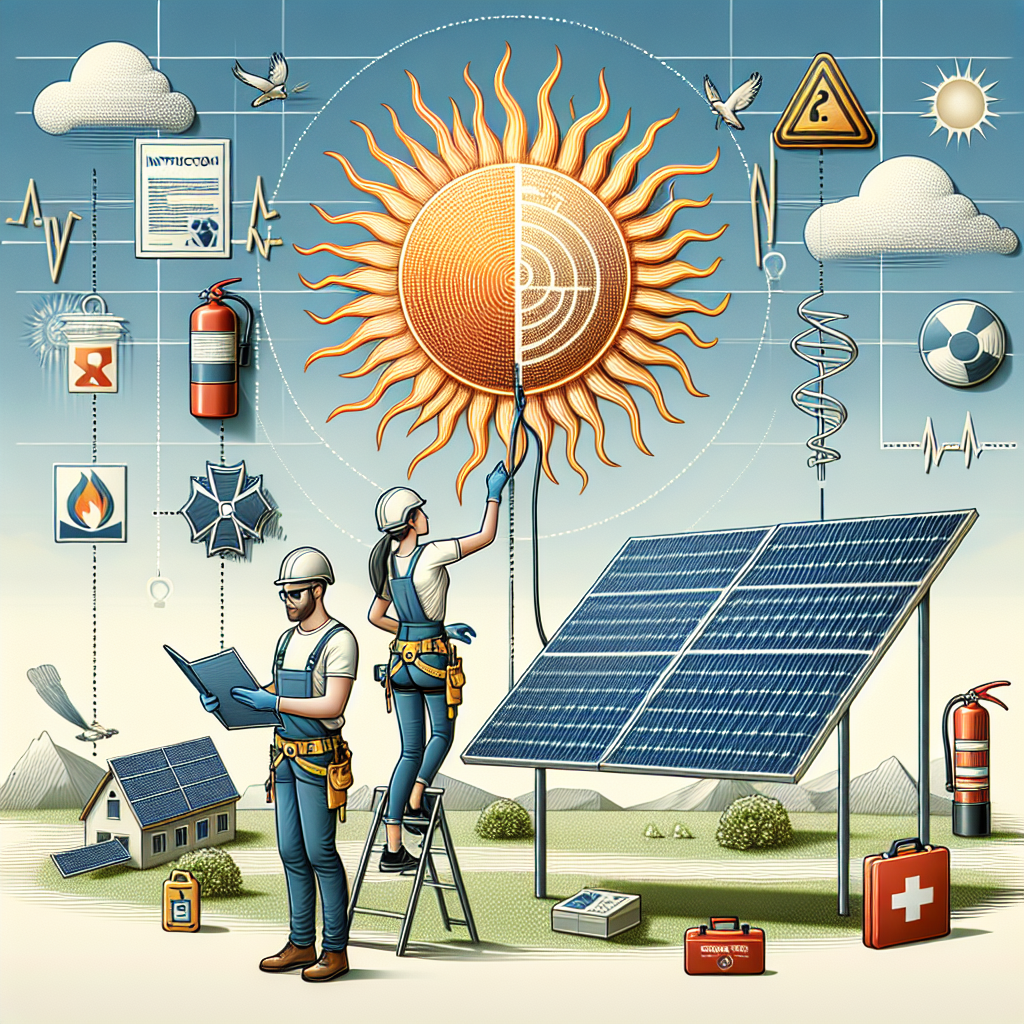Solar energy is a great alternative to traditional electricity sources, offering numerous benefits like cost savings and environmental friendliness. However, it’s important to be aware of the safety precautions that should be taken when using solar energy. In this article, we will discuss some essential safety measures that you should keep in mind to ensure a secure and trouble-free experience with solar energy. From proper installation techniques to regular maintenance checks, we’ve got you covered on everything you need to know to stay safe while harnessing renewable energy from the sun.

Solar Panel Installation
When it comes to installing solar panels, safety should always be your top priority. Proper handling, secure mounting and anchoring, as well as electrical safety measures are all crucial for a successful and safe installation.
Proper Handling of Solar Panels
Solar panels are delicate and expensive equipment, so it’s important to handle them with care. When moving solar panels, always wear protective gloves to prevent any damage. Avoid placing excessive pressure on the surface of the panels and be cautious when transporting them to ensure they remain intact and undamaged.
Secure Mounting and Anchoring
To ensure the stability and longevity of your solar panels, secure mounting and anchoring are essential. Consult with a professional to determine the best mounting options for your specific installation. Properly secure the mounts to prevent any movement or shifting caused by wind or other external factors.
Electrical Safety Measures
Electricity can be dangerous if not handled properly, so it’s crucial to follow electrical safety measures during your solar panel installation. Before starting any work, make sure to turn off the power supply and use appropriate electrical safety equipment such as insulated gloves. Double-check all connections and wiring to ensure they are secure and avoid overloading any circuits.
Electrical Components
Understanding and implementing safety measures related to the electrical components of your solar panel system is vital to prevent any accidents or damage.
DC Voltage Precautions
Direct current (DC) voltage is generated by solar panels and can be dangerous if mishandled. Always assume that the electrical components are live until you have confirmed otherwise. To minimize the risk of electric shock, avoid working on electrical components in wet conditions and take necessary precautions when working with DC circuits.
Proper Use of Cables and Connectors
Using the correct cables and connectors is essential for the safe and efficient operation of your solar panel system. Ensure that the cables are properly insulated and free from any damage or exposure. Use appropriate connectors that are compatible with your system to maintain a secure and reliable connection.
Inverter Safety
The inverter is a crucial component of your solar panel system that converts DC power into usable AC power. It is important to follow all safety guidelines provided by the manufacturer for the installation and operation of the inverter. Avoid tampering with the inverter internals without proper knowledge and training to minimize the risk of electrical shock.
Battery Safety Measures
If your solar panel system includes a battery, it is important to follow safety measures specific to battery usage. Ensure that the battery storage area is well-ventilated and properly secured to avoid any accidents. Regularly inspect the battery connections and keep the area free from any flammable materials to reduce the risk of fire.
Roof and Structural Considerations
The installation of solar panels often involves working on roofs, which presents its own set of safety considerations. Proper evaluation of the roof’s condition, reinforcement if needed, and fall protection measures are crucial for a safe installation.
Roof Evaluation and Reinforcement
Before installing solar panels, it is important to assess the condition of your roof. Ensure that the roof is structurally sound and capable of supporting the additional weight of the panels. If any repairs or reinforcements are required, consult with a professional to ensure proper reinforcement techniques are used.
Fall Protection Measures
Working at heights always comes with a risk of falls, so implementing fall protection measures is essential. Use appropriate safety equipment such as harnesses, lanyards, and guardrails when working on roofs. Ensure that all equipment is properly inspected and in good condition before use.
Wiring and Grounding
Proper wiring and grounding are crucial for the safe and efficient operation of your solar panel system. Seeking professional assistance, following appropriate wiring practices, and implementing ground fault protection are all important considerations.
Professional Assistance
Unless you have extensive knowledge and experience with electrical systems, it is recommended to seek professional assistance for the wiring and grounding of your solar panel system. A qualified electrician can ensure that all connections are properly made, minimizing the risk of electrical hazards.
Appropriate Wiring Practices
Following appropriate wiring practices is essential to prevent any electrical issues and ensure the longevity of your solar panel system. Use appropriate wire sizes, ensure tight and secure connections, and label all components for easy identification. Avoid running wires through high-temperature areas or exposing them to potential damage.
Ground Fault Protection
Ground fault protection is an important safety feature that can help prevent electrical shock and damage to your solar panel system. Ensure that all components are properly grounded and install ground fault protection devices as recommended by industry standards.
Fire Safety
While solar energy is generally considered a safe and clean source of energy, it is still important to be prepared for any potential fire hazards. Having fire extinguishers, implementing fire prevention measures, and knowing when to contact the fire department are all crucial aspects of fire safety.
Fire Extinguishers
Make sure you have suitable fire extinguishers readily available in areas where your solar panel system is installed. Familiarize yourself with the type of fire extinguishers suitable for electrical fires and how to use them properly. Regularly inspect and maintain the fire extinguishers according to the manufacturer’s recommendations.
Fire Prevention Measures
Implementing fire prevention measures can greatly reduce the risk of fire in your solar panel system. Keep the area around your panels clear of any debris or flammable materials. Regularly inspect and maintain your solar panels to ensure they are in good working condition and free from any potential fire hazards.
Fire Department Notification
In case of a fire emergency, it is important to know when to contact the fire department. Have emergency contact numbers readily available near your solar panel system and ensure that all household members are aware of the procedures to follow in case of a fire. Inform the fire department about the presence of a solar panel system to ensure they have all the necessary information.
Maintenance and Inspection
Regular maintenance and inspection of your solar panel system are crucial for optimal performance and safety. Proper cleaning, monitoring for faults, and periodic professional inspections should all be part of your maintenance routine.
Regular Cleaning
Regularly clean your solar panels to remove any dust, dirt, or debris that may accumulate over time. Follow the manufacturer’s guidelines for cleaning and use appropriate equipment to avoid any damage to the panels. Cleaning your panels not only improves their efficiency but also helps identify any potential issues.
Monitoring and Fault Detection
Monitor the performance of your solar panel system regularly to detect any faults or abnormalities. Most systems come with monitoring software that allows you to track energy production and identify potential issues. Be vigilant for any sudden drops in energy production or unusual behavior and address them promptly.
Professional Inspection
While regular maintenance is important, it is also crucial to have your solar panel system professionally inspected periodically. A qualified technician can thoroughly assess the system, identify any potential safety concerns or necessary repairs, and ensure that all components are functioning properly.
Protective Gear
When working with solar panels or any electrical components, wearing appropriate protective gear is vital for your safety. Safety glasses, insulated gloves, and protective clothing are some essential items to consider.
Safety Glasses
Protecting your eyes during installation and maintenance activities is important. Safety glasses with appropriate impact resistance should be worn to prevent any potential eye injuries caused by debris or accidental contact with electrical components.
Insulated Gloves
Insulated gloves provide an additional layer of protection when working with electrical components. They help prevent electrical shock by isolating your hands from any live circuits or components. Choose gloves designed specifically for electrical work and ensure they are in good condition before use.
Protective Clothing
Wearing appropriate protective clothing, such as long sleeves and pants, can help reduce the risk of injuries and minimize potential exposure to electrical hazards. Avoid loose-fitting clothing that may get caught in equipment and wear non-conductive footwear to provide additional protection.
Emergency Preparedness
Being prepared for emergencies is crucial to ensure your safety and that of others. Establishing an emergency shutdown procedure, creating evacuation plans, and having emergency contact information readily available are all important aspects of emergency preparedness.
Emergency Shutdown Procedure
Establish an emergency shutdown procedure that is easily accessible and understood by all household members. This procedure should outline steps to follow in case of any emergency situation, such as turning off the solar panel system and disconnecting any power sources if necessary.
Evacuation Plans
In the event of an emergency, having clear evacuation plans is vital to ensure a safe and orderly exit from your property. Identify safe evacuation routes, designate meeting points, and regularly practice evacuation drills with all household members.
Emergency Contact Information
Keep a list of emergency contact numbers readily available near your solar panel system. This should include local emergency services, utility companies, and any relevant contacts specific to your solar panel installation. Ensure that all household members are aware of this information and know when and how to contact the appropriate authorities in an emergency.
Environmental Considerations
When using solar energy, it’s important to also consider environmental safety. Safe handling of chemicals that may be used during installation or maintenance, as well as proper waste disposal, are important aspects of environmental safety.
Safe Handling of Chemicals
During the installation or maintenance of your solar panel system, you may come into contact with certain chemicals. It is important to handle these chemicals safely and follow all precautionary measures outlined by the manufacturer. Use appropriate personal protective equipment when handling chemicals and avoid any actions that may lead to spills or contamination.
Proper Waste Disposal
Proper waste disposal is essential to minimize the environmental impact of your solar panel system. Dispose of any waste materials, such as packaging or old components, in accordance with local regulations. Consider recycling options for materials that can be recycled to further reduce waste.
Educating Children and Pets
When incorporating solar energy into your home, it’s important to educate your children and take necessary safety measures to protect your pets.
Awareness for Children
Educate your children about the potential dangers associated with solar panels and electrical components. Teach them to respect the equipment and avoid touching or tampering with any part of the system. Encourage them to notify an adult if they notice any issues or abnormalities.
Pet Safety Measures
Pets may be curious and unknowingly come into contact with electrical components or chew on cables. Ensure that all electrical components are securely enclosed or out of their reach. Consider installing barriers or pet gates to prevent access to the solar panel system. Monitor your pets when they are in the vicinity of the system to ensure their safety.
By following these comprehensive safety precautions, you can enjoy the benefits of solar energy while ensuring the safety of yourself, your family, and your property. Remember to consult with professionals when necessary and prioritize regular maintenance and inspections to maximize the efficiency and longevity of your solar panel system.
